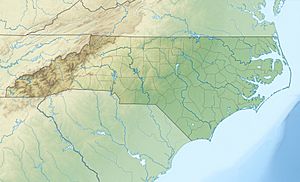Lick Creek (Brown Creek tributary) facts for kids
Quick facts for kids Lick Creek |
|
|---|---|
|
Location of Lick Creek mouth
|
|
| Other name(s) | Tributary to Brown Creek |
| Country | United States |
| State | North Carolina |
| County | Anson |
| Physical characteristics | |
| Main source | divide between Lick Creek and Shaw Creek about 0.5 miles southwest of Gordon Mountain 410 ft (120 m) 34°54′15″N 080°12′41″W / 34.90417°N 80.21139°W |
| River mouth | Brown Creek about 1 north of Mineral Springs, North Carolina 269 ft (82 m) 34°57′40″N 080°14′43″W / 34.96111°N 80.24528°W |
| Length | 5.15 mi (8.29 km) |
| Basin features | |
| Progression | south |
| River system | Pee Dee River |
| Basin size | 7.25 square miles (18.8 km2) |
| Tributaries |
|
| Bridges | White Store Road Lowery Road |
Lick Creek is a small but important stream located in Anson County, North Carolina. It's like a smaller helper stream, also known as a tributary, that flows into a bigger stream called Brown Creek. This creek starts its journey southwest of a place called Gordon Mountain and then travels north until it joins Brown Creek near Mineral Springs, North Carolina.
Contents
About Lick Creek
Lick Creek is part of a larger network of waterways. It eventually contributes its water to the Pee Dee River system. The area of land that drains into Lick Creek is called its watershed. This watershed covers about 7.25 square miles (18.8 square kilometers).
Where Lick Creek Begins
The creek starts high up, about 410 feet (125 meters) above sea level. Its source is in a spot southwest of Gordon Mountain. This starting point is where the land divides the water flow between Lick Creek and another stream called Shaw Creek.
Where Lick Creek Ends
After flowing for about 5.15 miles (8.29 kilometers), Lick Creek reaches its end. It flows into Brown Creek, which is its main destination. This meeting point is about 1 mile (1.6 kilometers) north of Mineral Springs, North Carolina. At this point, the elevation is around 269 feet (82 meters).
Water Flow and Bridges
On average, about 8.25 cubic feet (0.23 cubic meters) of water flow out of Lick Creek every second where it meets Brown Creek. This shows how much water the creek carries. You can cross Lick Creek using bridges on roads like White Store Road and Lowery Road.
The Lick Creek Watershed
A watershed is like a giant bowl where all the rain and snow that falls eventually drains into a specific river or creek. The Lick Creek watershed is mostly covered by forests, making up about 67% of the land. This means lots of trees help keep the water clean.
Land Use in the Watershed
About 30% of the land in the watershed is used for farming, which is called agricultural land. The remaining small part of the land is used for other things. The way land is used can affect the quality of the water in the creek.
Tributaries of Lick Creek
Lick Creek gets water from several smaller, unnamed streams that flow into it. These are called its tributaries. They join Lick Creek from both its left and right sides as it flows north.
 | James B. Knighten |
 | Azellia White |
 | Willa Brown |


